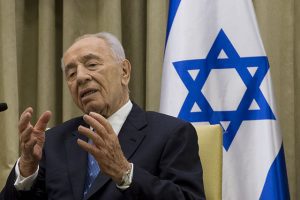Shimon Peres has passed away at age 93. Peres was the Israeli elder statesman who shared a Nobel Prize for forging a peace deal between Israelis and Palestinians. He served as a constant force for generations in Israeli politics.
Peres died after suffering a massive stroke two weeks ago. He had been making progress but doctors said he took a turn for the worse on Tuesday.
Peres held many top leaderships roles including Prime Minster and President. The Labor Party veteran was the face of the Jewish state and was well-respected in Israel and across the globe. Peres retired from public office in 2014 after the end of his seven-year term as President. He was in Israeli politics for more than half a century.
“There’s no corner of this country that he hasn’t touched,” Zionist Union Chairman Isaac Herzog once said. “Everywhere he goes around the world, people listen to him.”
Shimon Peres battled Israeli Prime Minister Yitzhak Rabin for Labor Party leadership in the 1980s and 1990s but eventually became Rabin’s foreign minister.
In that role, Peres concluded the Oslo Peace Accords, for which he was awarded the Nobel Peace Prize in 1994 with Rabin and Yasser Arafat.
“I am very grateful to him for a lifetime of thinking big thoughts and dreaming big dreams and figuring out practical ways to achieve them,” President Bill Clinton once said of Shimon Peres.
After Rabin was assassinated in 1995, Peres became Prime Minister, a position he held three times. Peres called early elections so that the government would have a mandate to pursue a two-state solution.
Peres faced a wave of Palestinian suicide bombings and other attacks that tarnished his peace process during this time as Prime Minster. The violence ultimately cost Peres the ensuing elections; however, he never stopped believing in peace. He continued to carry on the work of Rabin.
“Peace is costly,” Peres said in 2015. “Only thing is, war costs more.”
Shimon Peres was no stranger to making history. He became Israel’s ninth President. In 2007, he addressed the Turkish Parliament becoming the first Israeli President to speak to a Muslim country’s legislature. He called for peace talks in 2011 with the Palestinians, and warned the United Nations against recognizing Palestine as an independent state outside a peace plan. He received the US Presidential Medal of Freedom in 2012 from Barack Obama.
After leaving office in 2014 he remained in the public eye, continuing his work for peace in the Middle East.
When asked how he wanted to be remembered, Peres mentioned his dedication to peace.
“I feel like a person that has served this country rightly and properly,” he said. “And that is, in my judgment, the highest degree a person can feel.”
On this day, there are few Israelis who would disagree.



